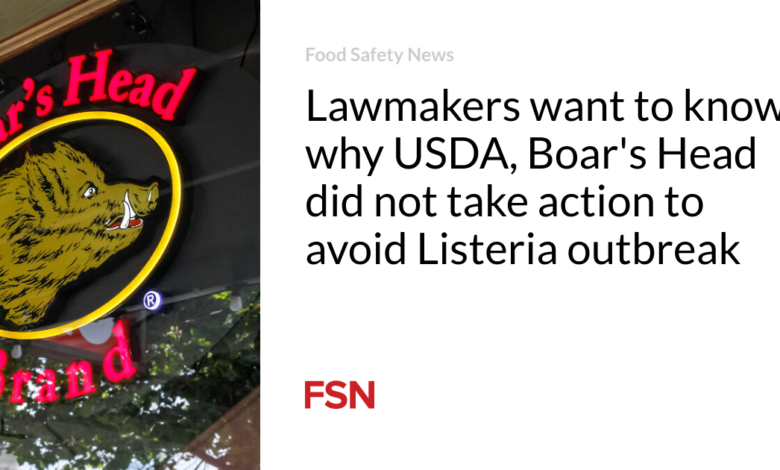Lawmakers want to know why USDA, Boar’s Head did not take action to avoid Listeria outbreak

A group of U.S. legislators are demanding answers from the USDA and Boar’s Head company officials regarding egregious food safety violations at a production plant that has led to dozens of hospitalizations and at least 10 deaths.
Rep. Rosa DeLauro, D-CT, is heading the group of lawmakers.
As a result of the Listeria outbreak, the company has closed its Jarrett, VA, plant and permanently stopped production of its liverwurst product nationwide.
The coalition has written to USDA Under Secretary for Food Safety Jose Emilio Esteban, USDA’s Food Safety and Inspection Service Administrator Paul Kiecker, and Boar’s Head Chief Operating Officer Larry Helfant.
“This outbreak could have and should have been prevented. What is especially troubling is how egregious sanitation problems occurred despite supposed regular oversight; oversight which typically includes at least one inspection per shift,” the legislators wrote to the USDA officials.
“According to records released by the United States Department of Agriculture (USDA), inspectors turned up 69 records of ‘noncompliances’ at this individual facility in the year leading up to the outbreak.”
The legislators noted that the USDA’s Food Safety and Inspection Service (FSIS) has the authority to contract with state departments of agriculture and other state agencies for inspections, but that the federal agency is ultimately responsible.
“It is appalling that seemingly no enforcement actions have been taken against Boar’s Head despite the reported repeated records of major noncompliance,” the legislators wrote in the letter to USDA’s Secretary and Administrator.
“Inspectors found and documented the following: mold and mildew around the hand washing sinks for staff working with meats that are supposed to be ready to eat; mold in holding coolers between the site’s smokehouses; blood in puddles on the floor; insects in and around deli meats at the plant, and ‘heavy meat buildup’ on walls and machinery.”
The legislators cited a New York Times story that reported that two years prior, “ U.S. inspectors warned that conditions at [the] Boar’s Head plant posed an “imminent threat” to public health, citing extensive rust, deli meats exposed to wet ceilings, green mold and holes in the walls.”
“If an investigator identifies an imminent threat, the agency must take immediate action to protect the public. Yet over a two-year period, apparently no immediate action was taken to fully correct this ‘imminent threat,’ and we are now responding to one of the worst Listeria outbreaks in recent decades,” the legislators wrote.
“The conditions at this facility were unacceptable and highlight a disregard for public health and food safety.”
The legislators said they wanted the USDA officials to answer eight main questions:
- FSIS had a contract for inspection in place with Virginia State to inspect the Boar’s Head Facility. What was the scope and nature of that contract, and what activities were conducted by the State versus USDA inspectors? Did contracted state inspectors perform all of the duties or just some duties as part of the contract? Who do the state inspectors report to and who manages Corrective Action Procedures, ensuring noncompliances are properly escalated and completely remedied? Please provide the results of any onsite reviews of the Virginia inspection program that have been conducted by USDA in the past three years.
- USDA inspectors are required by law to visit meat and poultry processing facilities at least once per shift. How often did a USDA inspector (not a contracted state inspector acting as a federal inspector) visit the facility in Jarratt, Virginia? Please provide documentation of the length of these visits, activities conducted during each visit, and noncompliances identified for the period August 30, 2022 through August 30, 2024.
- According to news reports, USDA has not taken any enforcement actions against the Boar’s Head Facility in the past year, despite over 69 records of “noncompliances” flagged by inspectors during that period, including reports of “dirty” machinery, flies in pickle containers, “heavy meat buildup” on walls, blood in puddles on the floor, and multiple instances of leaking pipes, clogged drains, and heavy dust buildup in certain areas. What enforcement actions are available to USDA to address the type of noncompliance issues identified in the Boar’s Head facility? Why were these actions not taken against Boar’s Head Facility despite repeated violations? Were all records of noncompliance addressed and remedied before operations resumed?
- Where is the inspection data managed, and is the data managed in a manner so FSIS can see food safety risks and trends?
- Can FSIS shut down a facility for being unsanitary? And by extension, do state inspectors acting at the discretion of FSIS have the authority to shut down a facility for being unsanitary? If yes, why was the plant not shut down despite repeated and similar noncompliances. If no, who has the authority to shut down the plant to protect public health?
- According to the Listeria Rule, an establishment may sample for Listeria monocytogenes or an indicator organism (e.g., Listeria spp.) to verify the effectiveness of its sanitation program. The establishment is not required to perform further confirmatory testing on Listeria spp. positives to determine whether they are positive for Listeria monocytogenes. Will FSIS consider amending this rule to ensure that establishments must conduct routine testing for Listeria monocytogenes or at bare minimum, to require confirmatory testing on Listeria spp. Positives for sanitation verification testing?
- FSIS Directive 10300.1 requires companies to schedule Intensified Verification Testing (IVT) for cause, including sampling of Listeria monocytogenes. Was IVT conducted on the Boar’s Head Facility associated with this outbreak? If so, please provide the full results of such testing.
- FSIS can schedule a Food Safety Assessment to verify that products are being produced in accordance with FSIS standards. Please provide the findings of any Food Safety Assessment conducted by FSIS in the Boars Head Facility between for the period 8/30/2022 to 8/30/2024 and indicate whether enforcement action was recommended as a result of such assessment.
- FSIS stated in a 2015 rulemaking on Listeria monocytogenes that “the percent positive in FSIS testing for Lm in RTE products has decreased from 0.76 percent in calendar year (CY) 2003 to 0.34 percent in CY 2013,” citing this as evidence that new regulations for Listeria were effective in controlling contamination. Can the agency provide data from CY 2014 to present showing the percentage of positives for Listeria monocytogenes in RTE products? Does the agency believe it collects sufficient product samples annually to detect statistical changes in the trend of product positives? Does the agency have other measures that show whether the current Listeria Rule is or is not effective in controlling Listeria in RTE products?
- Did the Boar’s Facility conduct its own testing for Listeria monocytogenes Listeria spp?Please provide the data from such testing and a summary of inspectional findings related to such testing. Please include information on where test results are stored and who had access to them.
Letter to Boar’s Head officials
In writing to the Boar’s Head officials, the group of legislators voiced many of the same concerns as they brought up to the USDA officials. They reiterated that the ongoing outbreak of Listeria infections is the most severe in decades.
“We are horrified by the reports of the conditions at the Boar’s Head Facility in Jarratt, Virgina. According to records released by the United States Department of Agriculture (USDA), inspectors identified 69 records of “noncompliances” at this individual facility over the last year,” the legislators wrote to the company officials.
“These conditions show a complete disregard for food safety and for the public health of the American people. As a company that operates within the United States and sells to American consumers, you have an obligation to protect public health and prepare and sell food that meets safety standards. With the science we have available, there is no excuse for the tragic loss of life that has occurred as a result of this outbreak.”
The legislators asked the Boar’s Head officials the following questions:
- The Boar’s Head Facility in Virginia opted for alternative 3 for the control of Listeria monocytogenes in post-lethality exposed RTE products as described in the Listeria Rule. Alternative 3, which consists of just using a sanitation program, is the weakest of the three alternative control options, since it does not include a post-lethality treatment or an antimicrobial agent or process (Alternative 2), or a post-lethality treatment and an antimicrobial agent or process (Alternative 1) and requires more testing for Lm or an indicator organism, particularly for food-contact surfaces. Did Boar’s Head explain to FSIS their thinking behind opting for Alternative 3, rather than the stronger alternatives? If yes, can you provide the reasoning and any communications to FSIS on this subject?
- Facilities using Alternative 3 must state the frequency with which the microbial testing will be done for food-contact surfaces in the post-lethality processing environment. How frequently did the Boar’s Head Facility test food-contact surfaces for Listeria monocytogenes an indicator organism? Did FSIS collect this data? If yes, please provide the data from such testing, especially for years 2000 to present.
- Did the Boar’s Head Facility test nonfood-contact surfaces for Listeria monocytogenes an indicator organism as part of its sanitation program? If yes, what did they test for and how frequently did they perform such tests? Did FSIS inspectors collect this data? If yes, please provide the data from such testing. If not, why not?
- How does Boar’s Head plan to remedy all instances of noncompliance and additional areas of concern regarding the conditions at the facility in Jarratt, Virginia? How does Boar’s Head plan to prevent similar instances of noncompliance in the future?
- Will Boar’s Head commit to investing in the clear infrastructure needs of the facility in Virginia, such as the numerous reported instances of leaking pipes, before restarting operations there? Why were operations not halted to make needed renovations to protect food safety?
- Why did managerial staff not act sooner to address safety concerns? How will managerial staff at this facility be held accountable for repeated food safety concerns and instances of noncompliance?
- How were conditions at this facility allowed to remain so unsanitary for such a long period of time? What policies are in place to ensure food safety and general cleanliness of operations? How can the American public be assured other Boar’s Head facilities are not experiencing the same problems?
- Please provide evidence for and of all third-party food safety audits and inspections.
- How are food safety decisions made at Boar’s Head and specifically at the facility in Jarratt, Virginia? Who at Boar’s Head headquarters manages food safety?
- Can you please provide the documented steps you did to manage the current recall for all the products you have voluntarily recalled over the last year? Please include the number of customers contacted, information that was shared with customers, the correspondence sent to customers, and if customer responses were tracked.
The legislators who signed the lettres are: Rep Rosa DeLauro, Sen. Richard Durbin, Sen. Cory Booker and Sen. Richard Blumenthal, Rep. Eleanor Holmes Norton, Rep. Greg Meng, Rep. Jennifer L. McClellan, Rep. Mike Quigley, Rep. M. Grijala, Rep. Rashida Tlaib, Rep. Dan Goldman, Rep. Bonnie Watson Coleman, Rep. John D. Larson, Rep. Jan Schakowsky, Rep. David Scott, Rep. Nydia M. Rep. Velazquez, Raja Krishnamoorthi, Rep. Julie Brownley, Rep. Marcy Kaptur, Rep. Robert Scott, Rep. Barbara Lee, Rep. Mark DeSaulnier, Rep. Danny K. Davis, Rep. Sanford D. Bishop Jr., Rep. Sheila Cherfilus-McCormick, and Rep. Gabe Amo.
(To sign up for a free subscription to Food Safety News, click here.)



